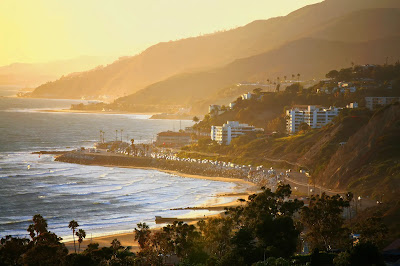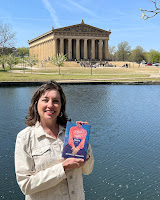Research is one of my favorite parts of the writing experience. I adore digging into history and reading about people who left their mark on the world. Rabbit trails can often lead me astray from the original topic I was researching, but they can also lead to some really cool stuff!
That's what happened to me a few weeks ago. I needed to know some facts about Malibu, California, a place I've never visited. Roads, landscape, houses, etc. Nothing overly exciting. So I jumped on the Internet...and discovered a fascinating story AND a fascinating woman!
 |
| The Pacific Coast Highway in Malibu, California Photo: Alamy |
First, a little history.
Prior to European or even Mexican settlement, the area of Southern California was home to the Chumash tribe of Native Americans. With the Pacific Ocean beating against the beaches and cliffs, the Chumash called this area Humaliwo, or "the surf sounds loudly." (Hint: "mali-woo" is where the name Malibu came from!) By the mid-1500s the beautiful area had been discovered by Spanish explorers. Spain claimed the land, and Spanish priests and settlers arrived in the 1700s. They moved the Chumash people into missions, but those were ultimately taken over by Mexico in the mid-1800s. The Chumash were once again at the mercy of foreigners, and what remained of the tribe was relocated to a reservation near Santa Ynez. In 1990, 213 Chumash lived there.
 |
| Rhoda May Knight Rindge |
Frederick had always wanted a farm by the sea, and once he purchased the 13,315-acre Malibu rancho as the final Spanish land grant owner of the property, he established a cattle ranch. Sadly, Frederick passed away unexpectedly in 1905. Rhoda May, a mother of three, found herself in an unusual position of power for a woman in her day---at the helm of a major family estate.
The State of California and the Southern Pacific Railroad both had eyes on the Rindge ranch. Located on the coast, the property was highly coveted. To prevent trespassers, surveyors, and the like, Rhoda hired armed guards. She also followed through with her husband's plan of building their own small railroad on their property to thwart the efforts of the Southern Pacific. There was apparently an obscure law that stated if one railroad ran through a property, no other railroads were allowed to build on it.
Next came 16 years of lawsuits brought on by the State and homesteaders surrounding her property that demanded she allow a public road through her property. The many suits cost her millions of dollars, leaving her land-rich but cash-poor. In the end, she eventually lost and the Roosevelt Highway, now called Pacific Coast Highway, was built. Determined to keep her family's legacy intact, Rhoda founded multiple businesses including famous Malibu Potteries, known for their gorgeous Malibu tile.
Rhoda died in 1941, penniless and estranged from one of her sons. The battle for Malibu had cost her dearly. Today, she is known as the Queen of Malibu and the Founding Mother of Malibu.
Your turn! Have you been to Malibu? Tell me about it!
Michelle Shocklee is the author of several historical novels, including Under the Tulip Tree, a Christy Awards and Selah Awards finalist. Her work has been included in numerous Chicken Soup for the Soul books, magazines, and blogs. Married to her college sweetheart and the mother of two grown sons, she makes her home in Tennessee, not far from the historical sites she writes about. Visit her online at www.MichelleShocklee.com
COUNT THE NIGHTS BY STARS
1961. After a longtime resident at Nashville’s historic Maxwell House Hotel suffers a debilitating stroke, Audrey Whitfield is tasked with cleaning out the reclusive woman’s room. There, she discovers an elaborate scrapbook filled with memorabilia from the Tennessee Centennial Exposition. Love notes on the backs of unmailed postcards inside capture Audrey’s imagination with hints of a forbidden romance . . . and troubling revelations about the disappearance of young women at the exposition. Audrey enlists the help of a handsome hotel guest as she tracks down clues and information about the mysterious “Peaches” and her regrets over one fateful day, nearly sixty-five years earlier.
https://www.tyndale.com/p/count-the-nights-by-stars/9781496459930
https://www.tyndale.com/p/count-the-nights-by-stars/9781496459930
http://www.rafflecopter.com/rafl/display/ce16d9c612/?





Thanks for posting today! I have never been west of Pennsylvania, even. The Pacific coast sounds lovely but I imagine I will get there only via the Internet. I found the detail about the reason for her building a railroad on her property interesting. It was sad that she lost so much trying to fulfill the dream she and her husband had.
ReplyDeleteThanks for sharing, Connie. Yes, it's sad that so many people, including native tribes, were always having their homelands taken away by the government. I've been to Malibu but didn't know the history about it. Now I'm curious to go back and see it with "new eyes."
DeleteThank you for sharing this amazing post!
ReplyDelete